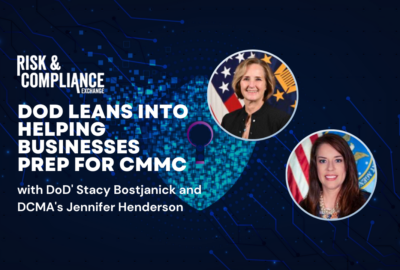Time for contractors to deal with the fiscal year-end
For what contractors should do to make the most of the time left, federal sales and marketing consultant Larry Allen joined the Federal Drive with Tom Temin.
It’s that most wonderful time of the year: the last few weeks of the fiscal. It’s when agencies try and spend money they have left before it disappears. And when contractors try for those final sales to make their numbers. For what contractors should do to make the most of the time left, Federal Sales and Marketing Consultant Larry Allen joined the Federal Drive with Tom Temin.
Interview transcript:
Tom Temin
Larry, with all of the politics and everything going on September 30 has kind of crept up fast.Larry Allen
Tom, it really has. We had the focus this summer on the two conventions, President Biden stepping down, so there have been a lot of potential distractions for people. But now we’re really in the home stretch with a little bit more than a month left in the fiscal year, and it’s time to focus.Tom Temin
And so, as we speak, there’s only really five weeks left until September 30; not even five weeks, about a month left. And there’s some tried and true techniques for contractors to get those last-minute dollars.Larry Allen
Tom, there are some tried and true techniques. And while I think some of them are obvious, some are not. What I’m telling people right now, the one that I think is probably more obvious but still worth mentioning, is the need to communicate. If you haven’t talked to your federal customer in a couple of weeks, or if you haven’t talked to that partner of yours in industry that you were talking with about pursuing a project together, it’s time to do that. You never want to take for granted that people remember the conversations you had even at the beginning of the month, and you want to make sure that you’re doing your part, to make sure to not only talk about your solutions, but how easy it is for that potential customer to do business with you, because the what and the how both matter.Tom Temin
And contracting officers are busy, and you’re not going to be necessarily at the top of their minds, and so you have to find a contracting officer that you know and make sure that whatever projects you have going with that agency continue to process through that CO.Larry Allen
That’s exactly right, and the sense of perspective really helps. We’ve talked before about the fact that your project is important to you, and I know mine is to me; that contracting office you’re dealing with has lots of projects. Yours may or may not be in the top three priority so it’s a good idea to keep touching base and make sure that that project you think is going to close by the end of the fiscal year does just that.Tom Temin
And then you also have to ensure that what you say you’ll deliver by the end of the fiscal to get paid for it, make sure you can really deliver that and maybe don’t over promise.Larry Allen
Yeah Tom. This is one of the things that I think we don’t talk enough about generally. And yet, when I talk to both current and former government officials, this keeps coming up as one of their top three issues with contractors, and that is the propensity to over promise and underperform, and nothing aggravates a federal buyer more, particularly at this time of year, than a contractor that says, “I can absolutely get it to you by a week from Tuesday.” But what she didn’t say is, “that’s a Tuesday in November or December.” Don’t promise more than you can deliver. Don’t bite off more than you can chew. One recent conversation I had with the Fed, Tom is that they believe that a member of the delivery team ought to be participating in at least some of the sales calls, so that the entire company, both sales and the delivery side, set common expectations and goals. That may be a best practice that companies want to consider, because it means you’re going to have satisfied customers that will come back to you.Tom Temin
Yeah, and the sooner you get those delivery and finishing people involved, the less likely you’ll have to do some, I don’t know, panic expediting on September 29.Larry Allen
Well, right. And you can only expedite so much. The government can only expedite so much. So if it’s going to take an extra couple of weeks, just be honest. Remember that your relationships and your reputation are on the line, and you don’t want to throw that away at year end or any other time of the year, for that matter.Tom Temin
We’re speaking with Larry Allen. He’s president of Allen Federal Business Partners. And another issue you’ve been writing about is the continuous protests that seem to have the hit the governmentwide acquisition contract (GWAC) program, especially from [the General Services Administration (GSA)]. That seems to be going on unabated, doesn’t it?Larry Allen
Tom, it really does. And I keep coming back to this issue about protests and governmentwide acquisition contracts, because I think that these types of protests, when you’re trying to set a new program up or continue an existing one, are probably the biggest threat to GWAC contracting generally. Once you get the contract in place, task orders are reasonably easy to fill, and you can really move at the speed of need, but it takes a long time — years, often — to get one of these major GWACs in place. And not just because of protests, but because protests are nevertheless part and parcel of this project, and we’re looking now not just at GSA programs, although Oasis, plus their services GWAC, now has seven [Government Accountability Office (GAO)] protests, but also [National Institutes of Health (NIH)] is no stranger to protests, unfortunately. And then going back to GSA, their Polaris IT program has been besieged by protests, and some of that time really gets into the venue in which contractors choose to protest. If you go to the Government Accountability Office, then you get a 100-day resolution window, and often things are disposed of much more quickly. But if you go to the Court of Federal Claims, which increasingly contractors are going to, they don’t have that timeline. It’s adjudicated when it’s adjudicated. And that’s one of the things that I think is really cropped up in Polaris as well as NIH’s [Chief Information Officer – Solutions and Partners (CIO-SP ) contract]. And we’re going to have to see what 2025 brings for these contracts.Tom Temin
So if things go to court, it could be years, whereas if they go to GAO, then it’s by statute, only months, right?Larry Allen
Right, only months versus years. And I think one of the things that contractors have to keep in mind is that, look, the government’s patience is not infinite in this. The reason we have a Polaris is because we couldn’t get an Alliant II small business. These contracts are valuable, but they’re only valuable if they get to live to see the light of day. My sense is that patience may be running a little bit low at GSA. I can’t speak to NIH, but at GSA, with some of the constant protests, because they do cost the agency money and time, just as they cost industry time. And there are several people who’ve already started to say, myself being one of them, do you really need another small business, IT GWAC, particularly if you can’t get it out the door? So you don’t want to necessarily kill the goose that laid the golden egg. You want to keep things in perspective.Tom Temin
And then finally, you are predicting a slowdown in defense spending, which is counterintuitive given what Congress wants to do, or what they’ve said they want to do in the budget proposals for DoD.Larry Allen
Tom, I think we’re setting ourselves up for a late fall, early winter slog between the House and the Senate on both the Defense authorization bill and the Defense appropriations measure in DoD land. Both are equally important, and while appropriations must pass, technically, the authorization bill is one that usually does pass. It’s been several years since it hasn’t, but you know, it’s not 100% must pass. And if you’ve been looking at some of the signals coming off of Capitol Hill, you can see that there’s really no sense of urgency to move the Senate version of the authorization bill. Conversely, they passed their version of the appropriations spending measure before they left town for August recess, but they did so at a level that’s basically guaranteed to set up a debate with the House over funding levels. And while this is an election year, normally you like to see, or expect to see anyway, defense spending go up. There are defense hawks, many of whom are running on a platform of reigning in government spending. So it’s by no means a given. I think it’s going to cause some delays in getting both final appropriations and authorization work done.Tom Temin
Yeah so, hurry up and wait.
Copyright © 2024 Federal News Network. All rights reserved. This website is not intended for users located within the European Economic Area.
Tom Temin is host of the Federal Drive and has been providing insight on federal technology and management issues for more than 30 years.
Follow @tteminWFED






